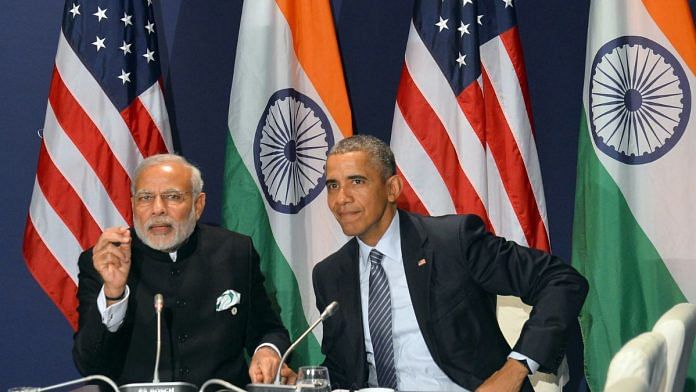Prime Minister Narendra Modi was barely back from a highly successful visit to the US and Egypt Sunday, when finance minister Nirmala Sitharaman waded into the ongoing controversy over former US President Barack Obama questioning the Modi government’s record over the treatment of its minorities.
“A former President, under whose rule six Muslim-majority countries were bombed with more than 26,000 bombs, how will people trust his allegations,” she told journalists at the BJP headquarters, naming Iraq, Saudi Arabia and some others.
The leverage
Clearly, Sitharaman was prepared for the question and the BJP wanted to send a message to the US. You need us as much as we need you: you want India to balance China in the Indo-Pacific; you want India to buy your Predator drones as well as your civilian Boeing aircraft. Yes, you will be involved in modernising India’s defence equipment and infrastructure, that will hold the key to revamping the relationship.
But this cuts both ways. India also has leverage over you.
It was interesting that no government minister directly involved in dealing with the US, baring Rajnath Singh, was fielded to send the message. Sitharaman is a member of the Cabinet Committee on Security (CCS), the most important part of the government – she was clearly hand-picked to send the message.
Equally significant, she delivered it from a party podium, not when she was wearing a government hat. That gives the message both credibility as well as some amount of deniability. If anyone in the US raises the harsh words and delivery as not being in sync with the happy buzz that accompanied the Prime Minister wherever he went in New York and Washington DC some days ago, the government can say that this is the party point of view.
Assam chief minister Himanta Biswa Sarma, who is said to be close to Home minister Amit Shah, the second-most powerful man in the country, had launched the first attack soon after Obama warned in an interview that “India could pull apart” if the Modi government continued to treat its minorities the way it was.
“There are many Hussain Obama in India itself. We should prioritize taking care of them before considering going to Washington,” Sarma tweeted, inverting the placement of Obama’s Muslim middle name so that no one had any doubts about what he was saying.
Odiya leader and BJP vice-president Baijayant Panda was not to be left behind. He dropped Obama’s last name altogether, calling him simply “Barry” in his tweet, signalling the party’s derision over Obama’s comment.
“What a ‘coincidence’ that Barry waited till that very moment before raining on the parade, by bizarrely trying to equate India’s record on minorities (see Pew et al) to China’s,” Panda said, referring to Joe Biden’s warm welcome of Modi.
Vijai Chauthaiwale, the head of the foreign affairs department of the BJP, was not to be left behind. He tweeted four images “from history” of Nehru’s visit to the US, without sourcing or hyperlinking or telling us in any way where the commentary was plucked from.
“…Nehru was much more interested in Pat Kennedy, JFK’s 25-year-old sister than in either Jack or Bobby,” went one tweet, while another referred to the suite in which Edwina Mountbatten, the wife of India’s last viceroy slept. “Edwina and Nehru were at least close friends if not more,” the tweet said, referring to the lascivious gossip over India’s first prime minister.
None of these leaders seem to have stopped to think what their comments would mean to the American audience they were ostensibly addressing. At least to their Indian audience, the crystal-clear message is that ‘PM Modi cannot be touched or targeted, so lay off.’
Also read: India and US becoming formal allies doesn’t mean unity. Far from it
The Middle East confidence
Nirmala Sitharaman also pointed out that PM Modi had received the highest laurels from 13 countries abroad, of which six were Muslim countries – this is, indeed, true. During his visit to Egypt on Sunday, Modi also received its highest state accolade, the Order of the Nile.
In Cairo, the PM visited the 11th century Al Hakim Shia mosque, which has been restored by the Indian Bohra community that has a large presence in Gujarat. Notably, he didn’t go to the Al-Azhar mosque – where Maulana Azad also studied – which has a huge influence not just in Egyptian society but across the Sunni Islamic world.
To be sure, the PM has visited several other important mosques abroad – among others, the Istiqlal mosque in Indonesia, the Chulia masjid in Singapore, the Sultan Qaboos mosque in Oman and the Sheikh Zayed mosque in UAE.
Jyoti Malhotra is a senior consulting editor at ThePrint. She tweets @jomalhotra. Views are personal.
(Edited by Anurag Chaubey)



